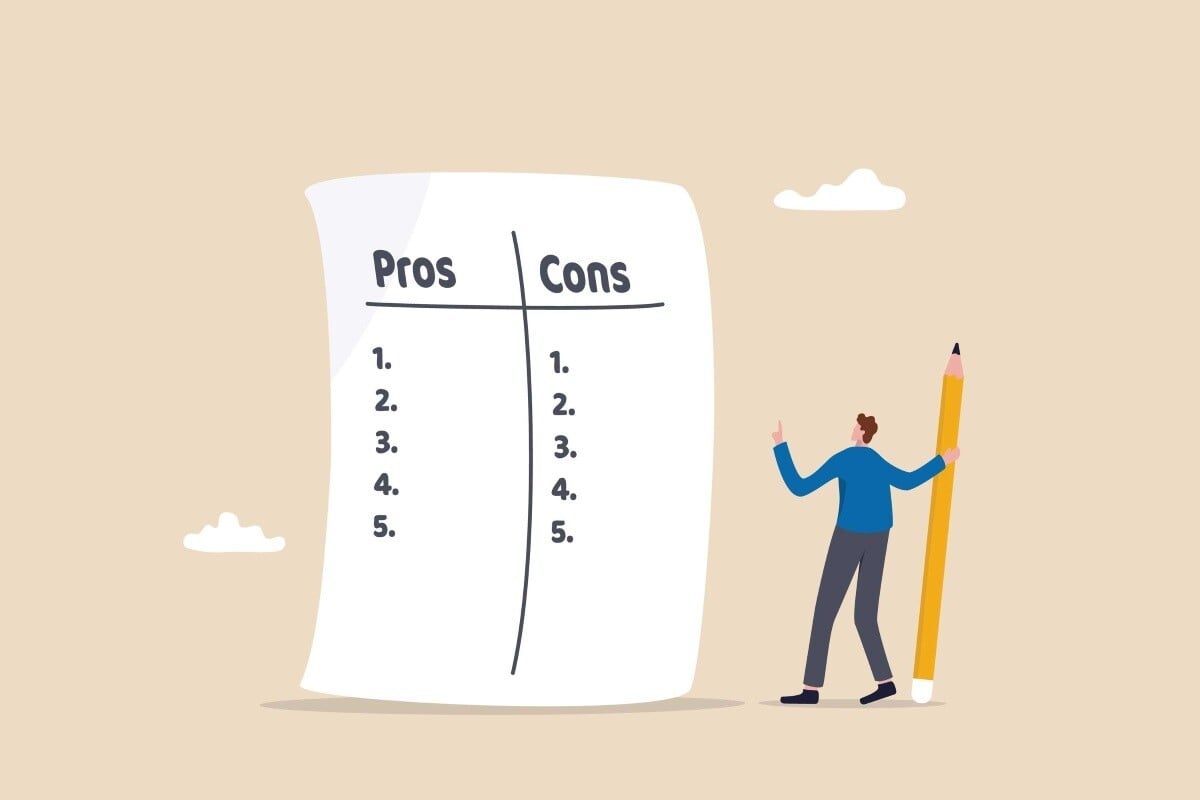10 Steps to Start a Franchise Business
Franchising can be a great way for business owners to rapidly grow their products or services with relatively low costs. However, building a...
14 min read
 Stephen Haarsma
:
Updated on February 20, 2025
Stephen Haarsma
:
Updated on February 20, 2025

I have been involved in franchising businesses since the early 1980's. At that time, franchising as a business growth strategy in Australia was in its infancy. Now, we are one of the biggest adopters of franchising in the world.
The Australian franchise industry employs around 520,000 people and contributes more than $135 billion each year to the economy. There are more than 1,100 franchisors and 70,000 franchisees operating in Australia.
However, while franchising is a very successful business model, it is important to carefully consider both the advantages of franchising and the disadvantages of franchising before making the decision to either franchise your business or buy a franchise.
Guide to Franchising Your Business
5 Advantages of Franchising Your Business
5 Disadvantages of Franchising Your Business
5 Advantages of Buying A Franchise
5 Disadvantages of Buying A Franchise
FAQ's
Franchising offers a way for you to grow your business while sharing risk. There are many advantages of franchising your business, including capital infusion, risk sharing, operational efficiency, scalability and economies of scale. I have set out 5 of the key advantages below.
One of the primary advantages of franchising is the injection of capital. When a franchisee commits to providing the funds required to establish a franchise outlet, it substantially reduces the financial risk for the franchisor compared to the risks associated with expanding the business through organic growth methods. This arrangement alleviates the need for the franchisor to seek external financing or increase its debt load, as the franchisee takes on the responsibility of investing in the franchise.
By opting for franchising, you can expand your brand without incurring additional debt or elevating the cost of equity. Franchisees are responsible for investing the necessary capital, which includes expenses such as fit-out costs, an initial franchise fee (which is paid directly to you), and the working capital needed to get each franchise location up and running. This financial model is particularly advantageous if your business strategy includes opening multiple outlets across various locations, allowing you to grow your presence and market reach efficiently.
Moreover, the franchisee may also take on the responsibility of entering into a lease with the landlord for the premises, further mitigating another layer of financial risk associated with managing multiple sites.
In addition to the benefits of franchising from a risk-sharing perspective, franchisees often have a higher level of motivation and commitment, which typically leads them to outperform managers in various aspects of the business. This performance advantage is evident in areas such as generating turnover and diligently monitoring expenses. For instance, franchisees tend to manage labour costs more effectively than managers. They often exhibit greater caution with wages and scheduling, ensuring that staffing aligns precisely with business needs to avoid unnecessary expenditures.
This heightened responsibility stems from the unique position of a franchisee, who unlike a salaried manager, has a substantial financial stake in the business. This investment creates a vested interest in the success and profitability of the franchise, fuelling a drive to optimise operations and maximise profit margins. Franchisees are incentivised to reduce costs and increase revenue, as their personal financial return is directly tied to the performance of their specific franchise location. This intrinsic motivation often translates into more efficient business practices, innovative problem-solving, and a proactive approach to market changes, all aimed at enhancing the overall profitability of the franchise.
Related to the franchisee having a stake in the success of the franchise business, a further benefit of franchising is operational efficiency, which is achieved through the decentralisation of daily tasks and responsibilities. A franchisee is responsible for the day to day operation of the franchise business.
When you, as the franchisor, are not responsible for the daily operations of each franchise business, it grants you the freedom to concentrate on broader strategic objectives. This shift in focus enables you to devote more time and resources to the big picture, such as driving innovation, enhancing brand management, and exploring new market opportunities. You can invest in research and development, refine your company's mission, and implement marketing strategies to strengthen your brand's position in the industry.
Moreover, franchisees often bring valuable local knowledge and established relationships within their communities, which can be leveraged to your advantage. This insight allows for a more tailored approach to building your brand in specific regions, as franchisees can offer unique perspectives on customer preferences and regional market trends. By working closely with franchisees, you can customise your products or services to better suit local demands, ensuring that your offerings resonate with a diverse customer base. This adaptability not only enhances customer satisfaction but also boosts the overall success and reach of your brand in various geographical areas.
The advantages of franchising for business scalability and brand extension are substantial. Franchising generally enables you to scale and grow your brand more quickly because you are not constrained by either financial or personal resources, which can often limit the speed and scope of expansion when attempting to grow a business independently. This model allows you to bypass the traditional hurdles of capital accumulation and resource management that typically accompany business expansion.
Imagine you have a business goal to open 10 new locations within the next 12 months. Each location is estimated to require an investment of $300,000.00. Without the option of franchising or licensing, you would need to secure a staggering $3,000,000.00 in addition to the necessary working capital to support such growth. This financial burden can be daunting, especially for businesses that may not have access to such funds readily. Moreover, the challenge doesn’t end with securing capital; you would also need to recruit and manage a workforce capable of operating and overseeing these new locations, which adds another layer of complexity and responsibility.
Furthermore, growth through franchising tends to be self-perpetuating. As your brand presence expands, it naturally attracts more prospective franchisees who are eager to be part of a growing and successful network.
Franchising enables you to take full advantage of economies of scale, a critical factor for business growth and sustainability. As your franchise network expands, you not only gain a larger customer base but also significantly enhance your bargaining power with suppliers. This increased leverage allows you to negotiate more favourable deals and substantial discounts, ultimately resulting in considerable cost savings for both you as the franchisor and your franchisees. This financial advantage is pivotal in maintaining competitive pricing and ensuring profitability across the network.
Furthermore, with a larger franchise network, suppliers are more inclined to prioritise your business needs, offering you access to higher-quality products or even exclusive offers that may not be available to smaller businesses. This prioritisation can greatly enhance the quality of goods and services you provide, reinforcing the reputation and reliability of your brand.
In addition to the enhanced bargaining power, the expansion of your franchise network also provides the opportunity to tailor your products or services to better align with the diverse needs and preferences of your growing customer base. For instance, if you own a coffee franchise, the growth of your network allows you to engage more deeply with suppliers to create and develop your own unique blend of coffee. This customised blend can serve as a distinctive feature of your brand, setting you apart from competitors and becoming a significant competitive advantage. It can captivate coffee enthusiasts and foster customer loyalty, thus further strengthening your brand's market position. Additionally, such customisation can provide insights into regional customer preferences, enabling you to adapt offerings to suit local tastes, which enhances customer satisfaction and drives business success.
While there are numerous advantages to franchising your business, it is important to consider the disadvantages of franchising as well, including loss of brand control, quality control issues, challenges of franchisee management, legal and regulatory issues and reputational risk. Here are 5 key disadvantages of franchising your business.
A major disadvantage to franchising your business is the loss of control. The flip side to the franchisee being responsible for the day to day operation of the franchise business is that you do not have control of the day to day operation of the franchise business. Consequently, you may encounter brand control issues and quality control issues.
In order to maintain consistency in the quality of your product or service, it is essential that your systems and processes are clearly documented and that your franchise documents adequately support franchisee compliance.
In addition to systems and processes, adequate training for franchisees and their employees will also assist to maintain consistency and quality across the franchise network.
Our article Disadvantages of Franchising - Loss of Control explores the topic of loss of control in more detail.
Another disadvantage of franchising your business is the resources required for training and continued support and management of franchisees. Developing and implementing a comprehensive training program for franchisees requires time and resources, as does the provision of ongoing support and franchisee management.
A common complaint made by franchisees is that their initial training was very basic and that they commenced operating the franchise business without really knowing what to do.
Franchisees also require ongoing support and management, which is crucial for their success and the overall growth of the franchise network. This support and management may include various aspects such as marketing assistance, operational guidance, and continuous communication.
To provide effective ongoing support to franchisees, you may need to allocate additional resources and employ specialised staff.
Perhaps one of the greatest challenges for a franchisor is managing poorly performing franchisees.
Often a franchisee is “locked in” to their franchise, due to financial investment and may be forced to continue to operate the franchise business when they are no longer motivated to do so.
If a franchisee is not performing and is unhappy, they can be difficult to move on and they can damage your brand.
Our article The Challenges of Poorly Performing Franchisees explores this topic in more detail.
Legal and regulatory issues are a further challenge of franchising. Franchising in Australia is heavily regulated. You need to ensure that you comply with the Franchising Code of Conduct and the Australian Consumer Law. In addition, you need to ensure that franchisees are complying with relevant laws such as the Privacy Act 1988 (Cth) and the Fair Work Act 2009 (Cth) (the Fair Work Act).
The Franchising Code of Conduct (the Franchising Code) is a set of regulations that governs the relationship between franchisors and franchisees in Australia [What is the Franchising Code of Conduct?]. Franchisors can face heavy penalties if they do not comply with the provisions of the Franchising Code.
Under the Franchising Code, franchisors are required to:
In addition to the Franchising Code, franchisors also need to comply with the Australian Consumer Law (the ACL). The ACL deals with franchising issues such as:
The Fair Work Act sets out the minimum employment standards for all Australian workers, including those employed by franchisors and franchisees. It covers areas such as wages, working hours, leave entitlements, and workplace health and safety.
In 2017 “franchisor liability” laws were introduced which included franchisor accessorial liability for serious contraventions of the Fair Work Act by franchisees.
Our article Franchisor Liability and The Fair Work Act considers this issue in more detail.
While the advantages of franchising for scalability and brand extension are significant, one major disadvantage of “fast growth” is ensuring that your new business as a “franchisor” has the necessary resources to adequately manage the expanding franchise network. Rapid growth can put a strain on existing resources, requiring careful planning and investment to maintain operational stability and brand consistency across all locations.
The business of franchising and being a franchisor is distinctly different from operating the core business that you have franchised. It necessitates a shift in focus from direct management of business operations to overseeing and supporting a network of franchisees. This involves ensuring that you have not only the right number of staff but also the right calibre of personnel who are skilled in franchise management. In addition, robust systems and processes must be in place to support the growing needs of a franchise network, including comprehensive training programs, effective communication channels, and efficient supply chain management.
There are ongoing challenges with franchising as the franchise grows. These include navigating the complexities of franchisee conflict, which can arise from disagreements over business operations or financial issues. Effective franchisee management is crucial to maintaining a harmonious network and ensuring that all franchisees are aligned with the brand’s vision and standards. Additionally, reputational risk becomes a significant concern; any negative incidents at one franchise location can impact the entire brand. Franchisors can often feel overwhelmed by these challenges if they do not have the appropriate processes and staff in place to assist. This can include dedicated teams to handle franchisee relations, legal compliance, and quality assurance, as well as investing in technology to streamline operations and maintain a cohesive brand image across all outlets.

There are many advantages of buying a franchise including working with an established brand and proven business model, being provided with training and support, having access to developed marketing and advertising campaigns and regulatory protections.
These advantages combine to provide a lower failure rate for franchises as compared to independent start ups. This may be attributed to the proven business model and existing customer base that a franchise can offer.
While these are not the only benefits, I have focused on 5 key advantages of buying a franchise below.
The main advantage of buying a franchise is brand name recognition.
The franchisor has already done the work to establish the brand, which means that you do not have to put in the time and resources to build the brand from scratch.
Well established franchisors provide you with an identity and a system which has proven to be effective and has a market impact. This brand recognition not only helps you stand out in a competitive market but also provides a sense of security. By aligning yourself with a well-known brand, you may be protected from market conditions, thanks to the experience of the franchisor and the strength of the established brand.
Furthermore, buying a franchise gives you the opportunity to benefit from the established recognition that customers have for the brand. Customers who are familiar with the brand are more likely to trust and choose your company or service, giving you a head start in attracting customers and generating revenue. This built-in customer base can significantly reduce the time and effort required to establish your business and start making profits.
In addition to brand name recognition, another advantage of buying a franchise, is the possibility of purchasing a turnkey business.
Purchasing a turnkey business considerably simplifies the start-up process. With a turnkey franchise, you are provided with a fully equipped and operational business, ready to run from day one. This not only saves you time and effort in setting up the business, but also reduces the risks associated with starting a new venture.
The turnkey nature of the business ensures a smooth transition into ownership and operations, giving you a head start in achieving your business goals.
Another advantage of franchising is comprehensive training. Well established franchisors will train you in everything from technology, to accounting, to standing behind the counter and taking money.
Training and support make the franchise model a much less riskier venture than buying a stand alone business or starting a business from scratch as:
In addition to the other advantages of buying a franchise, a major benefit of franchising is the opportunity to take advantage of national advertising campaigns. These campaigns may be included in the upfront franchise fee or an ongoing monthly fee that you pay to the franchisor.
National advertising campaigns can have a significant impact on your business. They help to raise brand awareness and attract customers on a larger scale. The frequency and scope of these campaigns are often beyond what a small business would be able to afford on its own. By participating in these campaigns, you can tap into a wider customer base and gain exposure that would otherwise be difficult to achieve.
National advertising campaigns help to establish and strengthen the brand identity of the franchise. Customers are more likely to trust and choose a brand that they are familiar with. This built-in customer base can greatly accelerate the growth of your business and contribute to its overall success.
Furthermore, a franchise network's ability to adapt to market trends is crucial in maintaining its competitive edge. With a strong brand and established customer base, a franchisor may be able to respond to changing consumer preferences and implement new strategies to meet their needs. This agility is especially valuable in industries where trends and technologies evolve rapidly, such as the food and technology sectors.
Franchising in Australia is heavily regulated which adds a further level of security and structure to the franchising model.
Franchisors must comply with the Franchising Code of Conduct and the Australian Consumer Law.
Before you enter into a franchise agreement, franchisors must follow the disclosure obligations required under the Franchising Code. Disclosure Obligations include:
While there are numerous advantages of buying a franchise, there are also disadvantages to buying a franchise including high initial investment, ongoing fees and royalties, limited autonomy, strict renewal terms, market saturation and negative brand publicity. Here are 5 key disadvantages.
One of the disadvantages of franchising is the high initial investment. Buying a franchise is not cheap, you will usually need to pay
In addition to the fees listed above you will need to pay the cost of the fit-out of the premises, equipment and inventory.
A further disadvantage is the royalty fees. You need to be aware of the ongoing fees. In addition to the initial franchise fees, ongoing fees are payable by you to the franchisor. However, the flip side of this is that an established brand name should provide you with recognition and revenue. There are numerous examples of franchisees who "de-badged" to avoid paying ongoing royalties, only to find that their revenue substantially decreased without the established name.
In addition, some franchisors will require you to refurbish franchisee stores to keep up with a changing image or theme. These possible refurbishments can cost in excess of $150,000.00.
Another disadvantage of franchising is lack of independence or limited autonomy. The controls and limitations imposed by the franchisor can include limitations on products, pricing, employees, policies, territory, marketing, working hours and other areas deemed critically important to the success of the franchisor and the franchised business as a whole.
There may be little freedom of scope for you to be creative; almost every aspect of operating the business will be regulated.
Further your ability to sell or transfer the franchise business is likely to be limited. Most franchised systems have some restrictions or obligations regarding the sale or transfer of a franchised business.
Our article on Franchise Autonomy considers this issue in more detail.
A disadvantage of franchising associated with brand name recognition is reputational risk. If a franchisor or other franchisees are receiving bad press or suffering from poor public perception then you may ultimately suffer.
While there are many excellent franchisors in Australia, not all franchise systems are soundly based or well run.
You should conduct comprehensive research on the franchisor and only enter into franchise systems which have a time tested and solid reputation within the industry.
One of the disadvantages of buying a franchise is that the growth potential of the venture is often limited compared to stand-alone businesses. Franchisors typically impose territorial limits on franchisees, which dictate where franchisees can operate. These limits are put in place to protect the brand and prevent franchisees from encroaching on each other's territories. However, this can restrict expansion opportunities for franchisees who may want to explore new markets or expand their operations beyond the designated area.
In addition, franchise agreements only allow you to operate the franchise business for a specified term. While you may be able to renew the franchise agreement at the end of the term, you may not necessarily be offered a renewal and there may be reasons why you are not able to renew. There are usually further fees and costs which are required to be paid to the franchisor on renewal.
Franchise agreements tend to be to the advantage of the franchisor.
Franchise agreements can contain heavy penalties if you breach certain clauses, including the ability for the franchisor to terminate the franchise agreement and to seek monetary compensation from you.
You should always seek your own legal advice before you enter into a franchise agreement no matter how reputable the franchisor is.
| What is the advantage of brand recognition in franchising? | In franchising, the brand is already established, which means customers recognise and trust the brand even before the new franchised location opens. This existing brand recognition helps in attracting customers and ensures a certain level of expected service and quality, thereby aiding in quicker business growth and stability. |
| What is the extent of support in terms of business operation for franchisees? | Franchisees often receive significant operational support, ranging from a comprehensive turnkey setup in some cases, to extensive advice and guidance on running the business effectively in others, which helps ease the management of daily operations and reduces the learning curve. |
| How does franchising impact business failure rates? | Franchises tend to have a lower failure rate compared to independent businesses due to the established systems, support, and existing customer base provided by the franchise model, which contribute to a more stable business operation. |
| What are the legal protections for franchisees? | Franchising is governed by the Franchising Code of Conduct, and franchisors are required to provide a Disclosure Document, which helps franchisees to be informed about the franchise. |
| What happens in terms of initial investment and risk? | In franchising, the franchisee typically provides the capital necessary for setting up the franchised location, thus reducing the financial risk and initial investment required from the franchisor compared to starting a completely new business. |
| How can an inconsistent customer experience dilute the franchised brand? | Franchisors face the challenge of maintaining consistent service and product quality across all of the franchised outlets. This can be difficult, especially if franchisees want to introduce local services or products. If certain franchisees fail to uphold the brand's standards, it can lead to negative customer experiences and negative customer reviews, and damage the brand's reputation. |
Disclaimer
The information in this article is general in nature and is not intended to address the circumstances of any person or other entity. Although we do our best to provide timely and accurate information, we do not guarantee that the information in this article is accurate or that it will continue to be accurate in the future.
*Disclaimer: This information is based on material published by the relevant franchisor on the Franchise Disclosure Register. This information does not negate the need to undertake necessary due diligence including seeking independent professional advice if considering entering into a franchise agreement.

Franchising can be a great way for business owners to rapidly grow their products or services with relatively low costs. However, building a...

August 12, 2022 On 1 April 2022 the Franchising Code of Conduct (the Franchising Code) was amended to insert a new clause 53 which sets out the...

This article was updated on 17 May 2025 In this guide we consider the franchise disclosure document, the importance of franchise disclosure document...